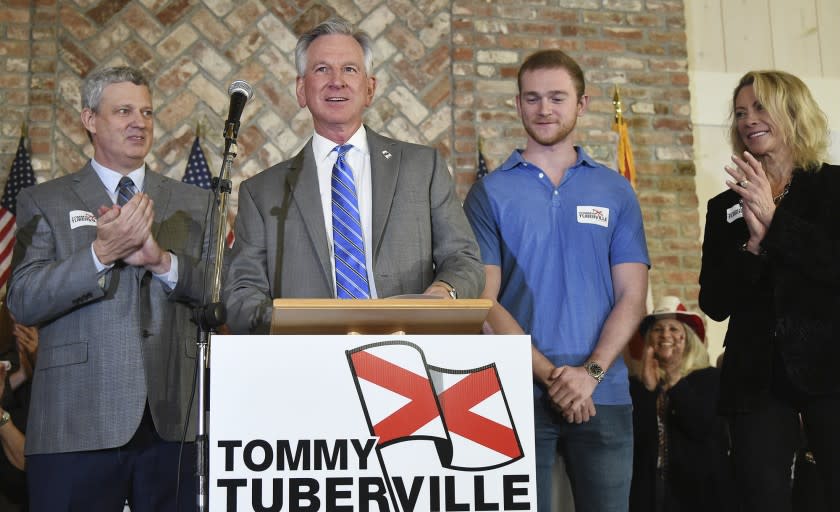Op-Ed: Republicans weaponized 'amnesty' to make undocumented immigrants suffer. Let's take it back

The scene in the TV ad: a football locker room. A man walks toward the camera, looking us dead in the eye. His name is Tommy Tuberville. He is a Republican, a former football coach, running for the United States Senate in Alabama. He makes three promises.
"We'll drain the swamp," he says. "Build the wall. No amnesty, ever."
I can understand "drain the swamp" and "build the wall" — Coach Tuberville has borrowed Donald Trump's MAGA chorus. But "no amnesty"?
Was anyone talking about amnesty? We are more than three years into the Trump regime, and anything resembling amnesty for undocumented immigrants is so far out of the picture we can scarcely remember it. Congress last considered large-scale legalization schemes under the last president and the one before that. Those were so loaded with conditions, so onerous and unforgiving, that calling them "amnesty" was a partisan stretch. They all failed.
America has moved on from arguing about unauthorized immigrants to brutalizing them, as a matter of federal policy. The Trump administration has raided their homes and workplaces, hunted them down at the border, abused and neglected them in custody and prosecuted people who tried to rescue them in the desert. Tens of thousands of immigrants are trapped in a vast detention archipelago, and many are now exposed to the deadly coronavirus. Parents have been forced to choose between being detained indefinitely or giving their children up.
Under the cover of the pandemic, immigration and asylum laws are being ignored. And any form of federal aid is off-limits to undocumented immigrants — even those risking their lives as essential workers to keep others safe, fed and healthy during the crisis.
So, amnesty?
It takes a particular kind of perversity for Republican politicians to be flogging that word — and variants like "bailout" and "handout" — at a time when immigrants are struggling just to stay alive. This month, Sen. Tom Cotton of Arkansas introduced the No Bailouts for Illegal Immigrants Act, which blocks funding to states or municipalities that give stimulus checks to undocumented immigrants.
Coach Tuberville would call it running up the score. It is merciless.
All this comes out of a playbook that redefines "amnesty" to mean anything that might make life more secure or less miserable for the undocumented. Under this definition, the deferred-deportation DACA program for young immigrants, now before the Supreme Court, is amnesty. A farmworker bill is amnesty. The latest Democratic stimulus bill is amnesty, because it temporarily protects immigrants in essential industries from deportation and allows them to receive pandemic relief. For similar reasons, Gov. Gavin Newsom's plan to slip a little disaster cash to undocumented Californians would be considered amnesty.
Tucker Carlson cries amnesty on Fox News. Acting Deputy Homeland Security Secretary Ken Cuccinelli cries amnesty on Twitter.
Undocumented immigrants, of course, are not waiting on amnesty. They're just trying to survive. Nadia Marin-Molina, co-executive director of the National Day Laborers Organizing Network, told me recently that COVID-19 has made the usual bad things worse. Immigrant workers are now dealing with sickness and severe unemployment on top of exploitation, wage theft, workplace dangers and Trump-era dehumanization. They are paying taxes without getting government benefits, losing jobs without unemployment checks, getting sick without health insurance. Many are missing rent and going hungry.
Some immigrants have been telling their stories in virtual gatherings to win support in Congress for an Essential Workers Bill of Rights. They have also been pressuring Gov. Andrew Cuomo of New York to follow California's lead in giving cash aid to the undocumented, which he has refused to do.
Braulio Rosaliano, who works in construction and food delivery in Brooklyn, said during a Zoom call of day-laborer advocates, “I know it's dangerous. I live in Sunset Park, one of the most affected areas. It's easy to say, yes, stay at home, but who is going to pay the rent, who is going to provide for our families?”
Maria Aguilar, a house cleaner from Brooklyn has lupus and had to stop working to avoid getting sick. She said on another call: “Staying home has resulted in me losing my ability to earn a living," she said. "I have no ability to pay rent, electricity, gas, phone and food."
Day-labor centers across the country adjusted quickly to the pandemic, adding hygiene training and COVID-19 updates to their classes on workplace safety and employment rights. Members are sewing masks and distributing money and food. And they are mourning colleagues, relatives and friends.
As immigrant advocates push for inclusion in life-saving pandemic aid, one of their rallying cries is "Y Nosotros Que?" And what about us?
It's an excellent question.
Amnesty is a word disliked in the immigrant-rights world, too. Many advocates reject it, because it means a gift to the undeserving. Workers who are paying taxes, raising children and contributing to our communities feel they have been demeaned and criminalized enough.
Amnesty is not a perfect word, and it’s been made toxic by right-wing forces. But it gets at something: the vast unpaid debt this country owes the undocumented. Amnesty is not on the table. But it should be. It's the least this country can do.
Lawrence Downes, an editor and writer in New York, covered immigration for the New York Times editorial board from 2005 to 2017.

